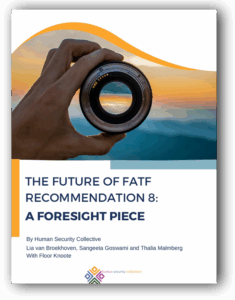
Evolution or Revolution?
The Future of Recommendation 8
“The Financial Action Task Force… one of the most powerful organisations you’ve never heard of.”
FICS’ Civic Futures initiative is proud to have supported new foresight research by the Human Security Collective. Authors Lia van Broekhoven, Sangeeta Goswami and Thalia Malmberg, with Floor Knoote, ask whether getting rid of the non-profit sector-specific terrorism financing recommendation from The Financial Action Task Force (FATF) would help alleviate the unwarranted overregulation, suppression, and financial exclusion to which civil society worldwide has been subjected over the past two decades.
The FATF, “one of the most powerful organisations you’ve never heard of”, was founded in 1989 by the G7 to fight financial flows from crime and the drugs trade. The premise was to evaluate countries based on a set of criteria to assess their risk level to the international financial system.
Months after the 9/11 attacks, Recommendation 8 (R8) was added to this mandate under the unevidenced assumption that not-for-profits (NPOs) were “particularly vulnerable” to terrorism financing.
R8 unintentionally “provided internationally sanctioned cover for governments seeking to legitimize a crackdown on critical civil society in their country”. From 2001, until this phrasing was amended in 2016, non-democratic governments were effectively rewarded by the FATF for enacting restrictive measures on civil society. Ironically, countries with stricter laws scored better on their compliance with R8, irrespective of the government’s track record on human rights.
In 2016, due to pressure and hard-fought lobbying from the Global NPO Coalition on FATF, R8 was revised resulting in the removal of the long-standing characterization of NPOs as being “particularly vulnerable”.
However, though the 2016 language adjustment was an important and welcome change, many of these restrictions had already been codified in national laws. The focus on NPOs as being inherently more vulnerable has trickled down into every facet of the financial-services industry, from bank compliance team training to software algorithms. This is despite the FATF’s openness to working with NPO coalition members to ensure compliance with new guidance as countries are reviewed .
This paper forecasts several possible approaches for the future of R8 and beyond.
Evolutionary approach: Should efforts focus on further refining the recommendation and its implementation to ensure civil society and its operational space are not impacted?
Revolutionary approach: Or is it more effective to address the broader challenges facing civil society, which are entangled in the complex landscape of legislative, regulatory, and policy measures aimed at combating financial crime?
Going beyond R8, this research asks wider questions around the accountability of the FATF as a body. Who is the FATF accountable to? How can those harmed by its actions seek redress? Who sits at the policymaking table? And more.
 FICS’ 2019 publication Rethinking Civic Space, identified that securitization would be one of the key drivers of closing civic space this decade. Recommendation 8 is just one of the many restrictions on civic space introduced post-9/11 in the name of national security and counter-terrorism. Through its Civic Futures initiative FICS collaborates with funders and civil society organisations working to counter this overreach, as well as with those striving to reform national security systems at the transnational level.
FICS’ 2019 publication Rethinking Civic Space, identified that securitization would be one of the key drivers of closing civic space this decade. Recommendation 8 is just one of the many restrictions on civic space introduced post-9/11 in the name of national security and counter-terrorism. Through its Civic Futures initiative FICS collaborates with funders and civil society organisations working to counter this overreach, as well as with those striving to reform national security systems at the transnational level.
FICS invests in cutting edge analysis like this think piece to help keep funders ahead of the curve in spotting opportunities and threats to civic space.
Read the full piece here.



